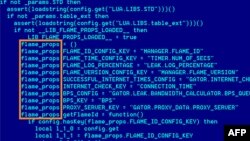A U.S. cyber security expert says it is "pretty likely" the United States and Israel are behind a sophisticated computer virus that appears to have been used to gather intelligence about Iran's nuclear program.
Tofino Security chief technology officer Eric Byres said there are only a few countries in the world with the resources to develop something as advanced as the so-called Flame virus.
The Washington Post newspaper reports Israeli and U.S. security agencies used Flame to collect information about Iran's preparation for a cyber attack aimed at slowing its nuclear program.
Byres says the virus can be used in a variety of ways.
"The primary focus of Flame as it is currently configured appears to be stealing or collecting intelligence, and that can be everything from what we call autoCAD drawings about factories, to emails, to even things like voice conversations or video of what is happening in the office around the computer that is infected," said Byres.
An Iranian state-run media report says Communications and Technology Minister Reza Taqupour has lodged complaints with unspecified "international organizations" about alleged "state cyber-terrorism." The report said Iranian officials blame detected computer viruses, including Flame, on Israel and "certain Western countries."
Earlier this month, The New York Times said U.S. President Barack Obama authorized cyber attacks on Natanz, Iran's main nuclear-enrichment facility. The report said the so-called Stuxnet computer virus was used to hamper operations at the site.
Byres says analysis reports indicate the Flame virus may be more targeted than Stuxnet.
"I would say it's a Middle East-focused piece of malware," said Byres. "There's also indications that it's designed to only run if it's in those time zones, that it's designed not to spread around the world like Stuxnet did and try and stay close to its drop area."
Western news reports say Flame came to light in May, after Iran detected cyberattacks against its oil industry. Some reports indicate the virus may have been developed at least five years ago.
Iran has been engaged in talks with world powers about the nature of its nuclear program. Tehran says its nuclear ambitions are peaceful, but the United Nations and some world powers have imposed sanctions on Tehran because of its uranium-enrichment activities.
Tofino Security chief technology officer Eric Byres said there are only a few countries in the world with the resources to develop something as advanced as the so-called Flame virus.
The Washington Post newspaper reports Israeli and U.S. security agencies used Flame to collect information about Iran's preparation for a cyber attack aimed at slowing its nuclear program.
Byres says the virus can be used in a variety of ways.
"The primary focus of Flame as it is currently configured appears to be stealing or collecting intelligence, and that can be everything from what we call autoCAD drawings about factories, to emails, to even things like voice conversations or video of what is happening in the office around the computer that is infected," said Byres.
An Iranian state-run media report says Communications and Technology Minister Reza Taqupour has lodged complaints with unspecified "international organizations" about alleged "state cyber-terrorism." The report said Iranian officials blame detected computer viruses, including Flame, on Israel and "certain Western countries."
Earlier this month, The New York Times said U.S. President Barack Obama authorized cyber attacks on Natanz, Iran's main nuclear-enrichment facility. The report said the so-called Stuxnet computer virus was used to hamper operations at the site.
Byres says analysis reports indicate the Flame virus may be more targeted than Stuxnet.
"I would say it's a Middle East-focused piece of malware," said Byres. "There's also indications that it's designed to only run if it's in those time zones, that it's designed not to spread around the world like Stuxnet did and try and stay close to its drop area."
Western news reports say Flame came to light in May, after Iran detected cyberattacks against its oil industry. Some reports indicate the virus may have been developed at least five years ago.
Iran has been engaged in talks with world powers about the nature of its nuclear program. Tehran says its nuclear ambitions are peaceful, but the United Nations and some world powers have imposed sanctions on Tehran because of its uranium-enrichment activities.





